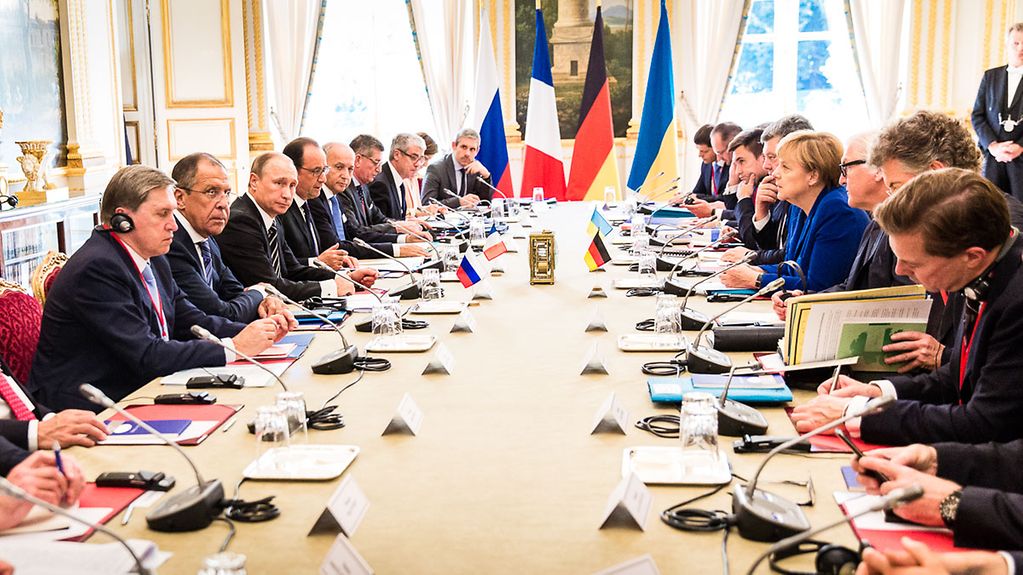Summit on the eastern Ukraine in Paris
Although it has not proved possible to keep to the original time plan, Chancellor Angela Merkel does see progress in the implementation of the Minsk agreements. In Paris, further steps were agreed to stabilise the situation in eastern Ukraine.

Angela Merkel discusses the implementation of the Minsk agreements with the Presidents of France, Russia and Ukraine
Photo: Bundesregierung/Denzel
Chancellor Angela Merkel has met with the Presidents of France, Russia and Ukraine in Paris. The "Normandy format" meeting discussed the situation in eastern Ukraine and the implementation of the Minsk agreements.
The two sides have moved towards one another, says Chancellor
At the meeting, Chancellor Angela Merkel and French President François Hollande explored possible ways of improving the security situation in eastern Ukraine with Russian President Vladimir Putin and Ukrainian President Petro Poroshenko.
"Both sides have moved towards one another," said Angela Merkel following the four-hour meeting. "This afternoon we have met for talks in a calmer phase, in terms of military activities," she said. The ceasefire provided for in the Minsk agreement has been largely respected since 1 September. Nevertheless, the meeting took place at a critical time, since important dates are approaching in the political process in eastern Ukraine.
The result, reported Angela Merkel is, "that the Russian President too has undertaken to work to have the necessary preconditions put in place at a very early date in the political working group of the Trilateral Contract Group, such that elections can take place as agreed in the Minsk package of measures."
The time plan laid out in the Minsk agreement cannot, however, be achieved, said Angela Merkel. "I believe that today we have achieved what was achievable. If we continue the process in this way, there is hope that the steps laid out in the Minsk package of measures can be taken, in spite of the delay compared to the original time plan." A lot of work is still needed and it is a difficult process, said the Chancellor. "I can’t say that as of today we will not suffer any further setbacks, but all in all it is a positive sign that we were able to meet today and that we were able to discuss matters intensively and very specifically."
Implementing the Minsk agreement
At a joint press conference with Chancellor Angela Merkel, French President François Hollande said that talks had focussed on four issues. In terms of security "we wanted to ensure that the withdrawal of light weapons agreed a few days ago will begin as of tomorrow morning," said François Hollande. The OSCE must "have unhindered and safe access to the whole territory of Ukraine, right up to the borders" if it is to be able to monitor implementation of the measures.
Angela Merkel and François Hollande also discussed the political process with Petro Poroshenko and Vladimir Putin. Angela Merkel said that the Russian President had undertaken to work to ensure that the planned elections can be held in line with Ukrainian law. Another topic on the agenda was the amnesty which must be accorded to all candidates standing for election in eastern Ukraine. It was agreed that, as of an election date still to be decided, the eastern regions of Ukraine will initially be accorded a provisional special status, reported the French President.
The humanitarian situation too was discussed by the four leaders. "We decided that the number of access points must be increased such that non-governmental organisations, and the humanitarian organisations Médecins sans Frontières and the Red Cross have unhindered access and such that the exchange of prisoners can be speeded up," said François Hollande.
With a view to the economic situation, the four leaders discussed Russia’s gas supplies to Ukraine. An agreement has already been initialled and is now to come into effect, said François Hollande. The four leaders agreed that their respective ministers of foreign affairs shall meet early in November to take stock of this process.
On 6 June 2014 Chancellor Angela Merkel met with Vladimir Putin, Petro Poroshenko and François Hollande while all were in Normandy at a ceremony to mark the seventieth anniversary of the D-day landings in Normandy. It was the first time the Russian and Ukrainian Presidents had met since the beginning of the crisis. Since then meetings involving the four countries have been referred to as "Normandy format" meetings.